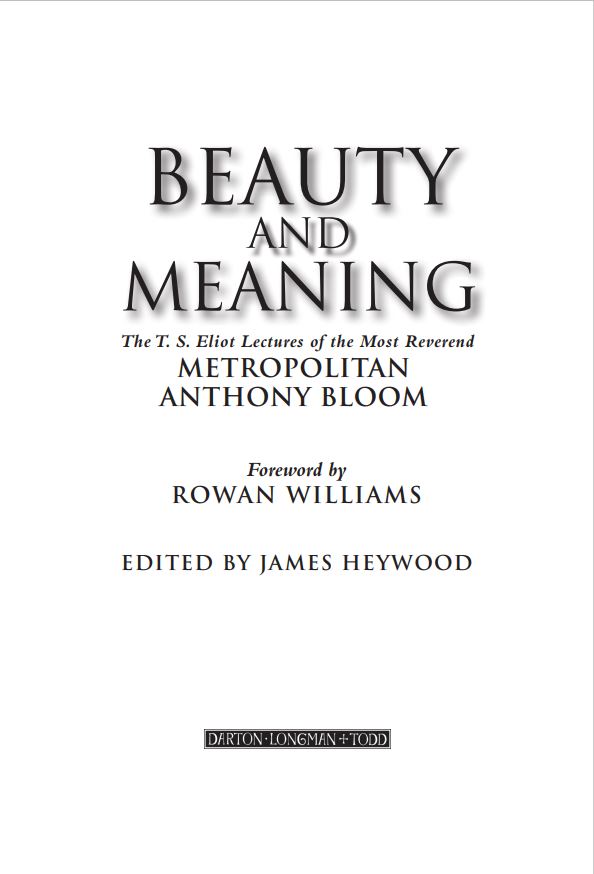
Beauty and Meaning
The T.S. Eliot lectures, given by Metropolitan Anthony Bloom in 1982, were at last published under the title of Beauty and Meaning by Darton Longman & Todd. Beautifully edited by James Heywood, and elegantly designed by the publisher, this book was launched at St Andrew’s Holborn in central London, on Saturday 30th September. The Anglican Bishop of Fulham, the Rt Revd Jonathan Baker, welcomed the large number of people who filled the church for the launch.
Bishop Rowan, a former Archbishop of Canterbury, and an expert on Orthodoxy and Russian religious thought, despite a train strike, valiantly travelled all the way from Wales by bus, and delivered a remarkable speech, without using a note, on Metropolitan Anthony’s lectures. Bishop Rowan expounded the book’s understanding of the artist’s vision, which receives and does not impose, which looks at the world without reading himself into it and seeing what he can get out of it. An awareness of beauty was a way of realising that reality is more than truth and that we can only see a fraction of reality. The artist transfigured the prosaic, enabling the familiar to become strange again. The work of an artist, Bishop Rowan argued, could only in fact be understood theologically: it needed more than secular philosophy – it needed a sense of God, a sense that He inhabits the world He has made. Particularly fascinating was Bishop Rowan’s explanation that a symbol bears the meaning of “bringing together”: like the two broken halves of a coin, the liturgy (and indeed our life on this earth) can be seen as one fractured half, held up to God with the belief that God has the other half. Finally, he referred to Metropolitan Anthony’s understanding of ugliness. Rather than seeing beauty as consolation, as a place in which to hide, which leads us to get locked within ourselves, we should rather recognise the ugliness and brokenness of our world and see that, out of the pain and shame, ugliness can play a positive role: indeed it is artistic engagement with brokenness that can be a powerful way of saying, in Bishop Rowan’s words, “This is not the last word”.
At the end of Bishop Rowan’s talk, Father Alexander Fostiropoulos, who chaired this part of the meeting, then invited questions from the audience. The event ended with a panikhida in memory of Metropolitan Anthony, which was served by Father Alexander Fostiropoulos.
Church House Bookshop set up a bookstall at the back of the church, selling copies of Beauty and Meaning: all were sold, and a long list of orders taken, which hopefully indicates that this book has a strong popular appeal. As James Heywood, the editor, wrote in his Note at the start of the book, Metropolitan Anthony “was a spiritual leader who acquired many disciples because of his wisdom, his integrity, and his ability to express in words, both in Russian and English, the most profound spiritual and moral truths, in a way that spoke directly to the heart of his listeners.” It is to be hoped that readers of Beauty and Meaning will be able to hear Metropolitan Anthony as those who knew him in life and received so much from him.
Xenia Dennen
November 2023

